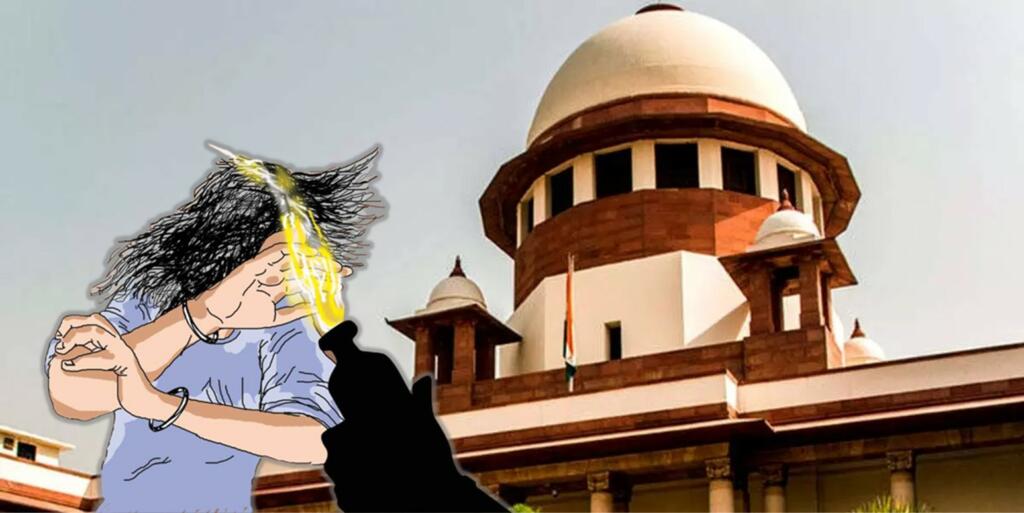The Union Minister of State for Home Affairs, Ajay Mishra told the Parliament that 386 acid attacks on women were registered in the country between 2018 and 2022. During the same period, 62 attackers were convicted by the courts in India. Despotically, the ground reality hasn’t changed much despite serious interventions of the courts and the legislature alike. In April 2015, the Apex Court issued various guidelines for betterment of ‘Acid Attack Survivor’ in the landmark case of Laxmi vs. Union of India.
Progressive outlook on Acid Attack survivors
Acid attacks in India are a form of gender-based violence that has a devastating impact on the lives of the victims. Despite stringent laws and regulations in place, acid attacks continue to occur in India. To address the issue, a more multifaceted approach needs to be undertaken. This includes stricter enforcement of the laws, increased awareness and better support for victims.
More significantly, the grievance mechanism should be made more robust to ensure increased proper support and assistance is provided to the victims of acid attacks, as innumerably high numbers of victims do not report the attacks due to fear of retaliation, social stigma and lack of faith in the justice system. However, to overshadow most of these lacunas, the Apex Court gave detailed guidelines in the case of Laxmi vs. Union of India.
Factual Backdrop
The instant case arose out of a public interest litigation filed by Laxmi, an acid attack survivor. Laxmi, who happened to be a teenager at the time of occurrence of the mishap, had denied to marry Naeem Khan aka Guddu. Following which three men attacked her on the streets and poured acid on her. The incident caused immense pain and trauma for the victim and despite innumerable surgeries she could not get her face back as she suffered grievous injuries and burns.
Consequently, the accused were tried and convicted for attempted murder by the lower court. Subsequently, the Delhi High Court granted bail to the accused. Dismayed by the approach of the Delhi High Court, the victim filed a PIL in the Supreme Court to target the easy availability of acid in the nation, with lack of appropriate legislation on acid attack cases, including expenses, surgeries and rehabilitation for acid attack survivors.
Issue before the Apex Court
The prominent issue before the Apex Court was to facilitate considerable amendments in the Indian Penal Code, 1860 and Criminal Procedure code, 1973, for better redressal of acid attack cases. Further, to impose a complete ban on the sale of acid over the counter and provide appropriate compensation mechanisms for rehabilitation and treatment of the acid attack victim.
Dictum of the Supreme Court
The Supreme Court banned the over-the-counter sale of acid across India in the wake of rising acid attack incidents. The Bench comprising Justice Madan B. Lokur and Justice Uday Umesh Lalit also instructed the state governments to issue acid-sale licenses to select retailers who were directed to keep a record of those buying acid, after checking their ID proof. Further, the Apex Court provided that a minimum compensation of 3,00,000/- to every acid attack victim shall be paid by all the states and the union territories. In addition, the Bench furnished elaborate guidelines for tackling the menace of acid attacks.
Firstly, the Court provided that the sellers shall maintain a log/register as per format for recording the sale of acid which will contain the details of the person to whom acid is sold and the quantity sold. Secondly, no acid shall be sold to any person who is below 18 years of age. Thirdly, the seller shall sell acid only after taking appropriate identity proof of the buyer. Lastly, all the stocks of acid must be declared by the seller with the concerned Area Sub-Divisional magistrate (SDM) within 15 days.
Consequently, if any undeclared stock of acid is detected, it would be confiscated by the concerned SDM and would attract a fine of up to Rs. 50,000 on the seller.
Significant Developments post-Laxmi Verdict
Seven years down the line, one can still buy a bottle of acid, online or at a kirana store, without any verification. Having said that, the Laxmi case flared the spark which changed the criminal jurisprudence around acid attacks and related offenses. As a consequence of this judgment, the Code of Criminal Procedure, 1973, was amended to incorporate section 357-A to provide for compensation to the victim or their dependents and provide a scheme for providing funds to all those who have suffered loss or injury due to such an acid attack and need rehabilitation. Further, an amendment was also made in Indian Penal Code, 1860, wherein two sections 326-A and 326-B were inserted to exclusively deal with the offense of acid attack.
Moreover, owing to this judgment, the Victim compensation scheme was incorporated in the Indian legal system and section 357C was inserted under CrPC that provides that all the hospitals whether private or public, run by central, state government or local bodies should provide the first aid or medical treatment free of cost to acid attack survivors. Further, providing no hospital/clinic can refuse treatment of an acid attack victim and if any such complaint is made, the victim can take further appropriate legal action. However, a lot more needs to be done to change the reality at ground zero.
Support TFI:
Support us to strengthen the ‘Right’ ideology of cultural nationalism by purchasing the best quality garments from TFI-STORE.COM
Also Watch:
https://www.youtube.com/watch?v=_wtCZrE5skc
